Davenport’s Putnam and Moline’s Fourth Wall Featured in Inaugural Civic Season
 Saturday in the Arts is a weekly feature covering a trend, subject, event or personality of local interest. It runs every Saturday morning on your site for the best entertainment and arts coverage in the area, QuadCities.com!
Saturday in the Arts is a weekly feature covering a trend, subject, event or personality of local interest. It runs every Saturday morning on your site for the best entertainment and arts coverage in the area, QuadCities.com!
Celebrating the Fourth of July is more than barbecues, fireworks, flags and parades. It’s about honoring where America came from, where we are now, and how we can continue to form a more perfect union – together as one nation.
That’s part of the invigorating, animating force of the first Civic Season – a national effort about expanding the lens, making space for more stories from the past, more voices from the present, and more input on what an annual tradition for civic participation could look like.
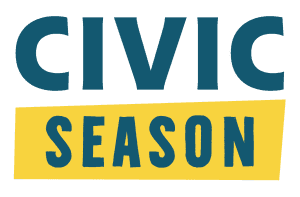
The Civic Season was created by the coalition Made by Us with Civics Unplugged.
Davenport’s Putnam Museum & Science Center and Moline-based Fourth Wall Films are among nearly 200 historic sites, museums and organizations that have assembled 450-plus virtual and in-person activities that celebrate this star-spangled season – formally from Juneteenth (June 19) through Sunday, July 4.
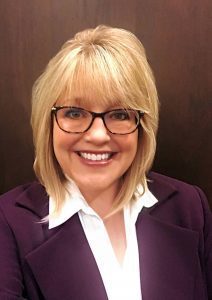
Rachael Mullins is president/CEO of the Putnam Museum & Science Center.
“It’s so wonderful for a first year — to see that great participation really says a lot,” Putnam president/CEO Rachael Mullins said recently of the epic collaborative effort and bountiful website, www.thecivicseason.com. “I think that people are really hungry for civic discourse on history, on current issues. So that as we move forward with setting a course for the future, that’s more inclusive and we’ve added voices to that — to that process of, how do we tell our stories and record history?” “It’s a really great site to just kind of spend some time with and reflecting the search process allows you to explore different issues or you can explore only the time periods and dates,” she said. “So it’s a really an exciting research tool I think as well.”
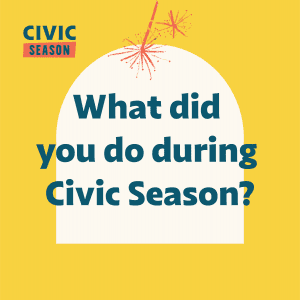
The first Civic Season is a national collaborative effort of 200 historic sites, museums and organizations that assembled 450-plus virtual and in-person activities.
Civic Season perfectly aligns with a long-term initiative the Putnam has been working on, with several local organizations and leaders — to transform a permanent Q-C history exhibit (“River, Prairie and People”) so it’s more inclusive and representative of the area’s increasingly diverse population.
“We’re digging deeper on some of those stories that are not currently represented and should be,” Mullins has said, “and also closing the gap in our more recent history to make sure the content is relevant to current generations and their more immediate history.”
At the museum and science center (1717 W. 12th St., Davenport), “River, Prairie and People” takes visitors back in time as they discover what the Q-C was like for its earliest inhabitants, and how the Mississippi River helped form the community.
It shows how the region took shape through milestones such as the founding of Davenport by Antoine LeClaire, and how the Civil War brought about the Rock Island Arsenal. Its artifacts include the famous Davenport Tablets, Bix Beiderbecke’s cornet, and shows how John Deere built his company here.
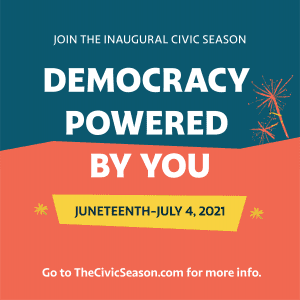
Celebrating the season from Flag Day to July 4th, Civic Season aims to make space for more stories from the past, more voices from the present, and more input on what an annual tradition for civic participation could look like.
A broad coalition formed to re-examine the local history exhibit, and the Putnam plans to rename it as well, aiming for a finished transformation by summer 2022.
Mullins said the working title – “The Ground on Which We Stand” — refers to “the geography we all share in the Quad-Cities, but also an understanding of the incredible impact of the heritage of our community in shaping our collective values,” she said.
Visitors to the Civic Season site can curate their list of experiences by choosing interests (i.e. Independence and Freedom, African American Experience, Repairing and Remembering, etc.), location and amount of time they can spend, making it easy to get involved. The directory contains a wide range of submissions — examples include an online exhibit entitled “From Slavery to Freedom” at the John Heinz History Center, a live-streamed naturalization ceremony hosted by Monticello as well as several events and exhibitions commemorating Juneteenth and Independence Day.
The Civic Season has been promoted by a digital and social media campaign, including a kickoff video highlighting the voices of youth activists such as Jamie Margolin, Taylor Richardson and Miss Sara Mora as well as two public dialogues hosted on the Clubhouse app in collaboration with History Club.
It’s created by by Made By Us (slogan: “There’s no end to making a more perfect union”) — an unparalleled collaboration among over 100 of the nation’s leading history museums and civic institutions. The coalition is devoted to inspiring, informing and empowering Millennials and Gen Z with history as we approach the nation’s 250th anniversary in 2026.
The initiative is collectively led by Atlanta History Center, the Charles H. Wright Museum of African-American History, First Americans Museum, History Miami Museum, Missouri Historical Society, National Archives Foundation, New-York Historical Society, Senator John Heinz History Center, Smithsonian’s National Museum of American History, and the Thomas Jefferson Foundation, Monticello.
Working alongside Civics Unplugged, a nonprofit social enterprise led by Gen Z’ers, Made By Us developed Civic Season to connect existing history and civics resources with the next generation’s appetite for topics like freedom, justice, identity, immigration, and citizenship.
“Over the decades, the American story has been shaped by many hands and many moments, and those ideals have been unevenly shared,” said Neil A. Barclay, President and CEO of the Charles H. Wright Museum and a Made By Us steering committee member. “Part of Made By Us’ mission involves telling a more complete version of history, and empowering the next generation to take part in shaping the future.”
While all Americans are invited to participate in Civic Season, Made By Us and Civics Unplugged aim to connect with the next generation—high school through age 30—a demographic that is highly engaged in understanding, creating and applying their civic identity, according to the program’s press release.
“Gen Z is one of the most civic-minded generations in history,” said Gary Sheng, co-founder and COO of Civics Unplugged. “By bringing together respected institutions and passionate young people for Civic Season, we have the power to create lasting traditions with unlimited potential.”
In the summer of 2020, research conducted by Made By Us revealed that Gen Z was closely examining their patriotism, citizenship and what it means to be an American. At the same time, Civics Unplugged was building a cohort of Gen Z activists dedicated to the future of democracy. They saw an opportunity to imbue more meaning, complexity and connection to the 4th of July. Civic Season will provide all Americans with a meaningful way to reflect, commit, and take action to build a stronger democracy and shape a reinvigorated tradition.
“The past year’s challenges revealed our interdependence, spotlighted our deficits, and drove a groundswell of interest in America’s future,” said Caroline Klibanoff, managing director of Made By Us. “Through Civic Season’s powerful shared experiences, we can expand the dialogue around the impact that history has on all aspects of our lives.”
America’s history is complex and evolving, and it’s up to every one of us to do the hard work to strengthen and sustain our democracy, the release said.
“We chose to launch Civic Season during these two tentpole moments in history to demonstrate the evolution of our collective American story, and help the next generation find the meaningful engagement they crave with the past. Civic Season provides an opportunity to explore how a season of commemoration can go beyond fireworks and BBQ to connect communities and individuals with civic participation, ultimately inspiring year-round involvement.”
From Smithsonian to “Changing Lives”
The Putnam got involved in Civic Season since it’s among more than 200 affiliates of the Smithsonian Institution, who were all encouraged to participate, Mullins said.
“We identified some local artifacts and exhibits that we felt really aligned with some of the tenets of Civic Season,” she said. “And I am pleased that our submission of our ‘Liberated Voices/Changed Lives’ exhibit was selected,” and a short video of Mullins discussing the 2020 exhibit – and the historic role of Royal Neighbors of America (the major sponsor) – is on the Civic Season site.
This three-minute video highlights the women’s suffrage movement in Eastern Iowa and Western Illinois and technology that gave women the time and capacity to advocate for the vote. The video was made in conjunction with a temporary Putnam-original exhibit that was mounted in 2020.
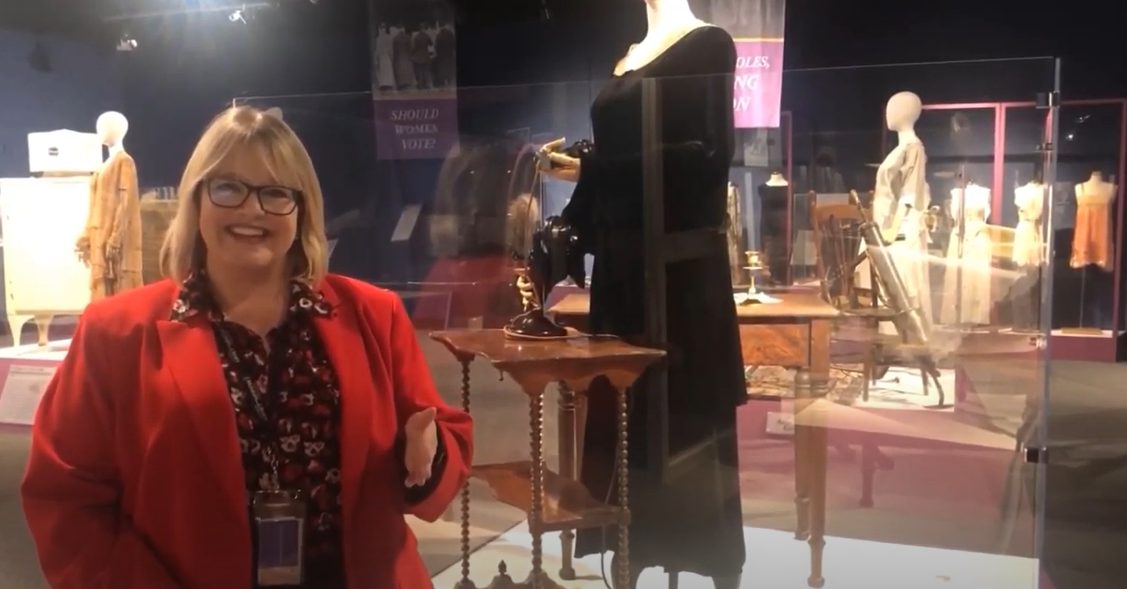
Mullins in the short Civic Season video from the Putnam’s original 2020 exhibit, “Liberated Voices/Changed Lives,” on women’s suffrage in the U.S.
The Putnam extended its exhibit on the movement (which opened in March 2020, just as Covid shut the museum down) until Nov. 4 (the day after the presidential election). On Aug. 26, 2020 — the 100th anniversary of the signing of the 19th Amendment — the museum hosted a Zoom gathering of local women, replacing a previously planned live in-person celebration.
“Some of the discussion we’ve had is that ‘hard won, but still not done’ kind of approach. Though the recognition of the right to vote was an incredible milestone for women, there still are inequities, there still are challenges, and there still is a fight to continue to receive equal status,” Mullins said, noting they also celebrated the 125th anniversary of Rock Island-based Royal Neighbors of America, which was an early innovator in supporting women’s suffrage.
The Putnam exhibit showcased how changing technology provided more time for women to work on the suffrage movement. The Aug. 26 online event touched on two of the Quad-Cities women who were featured in a touch-screen exhibit on local people who worked for and against suffrage between 1900 and 1920.
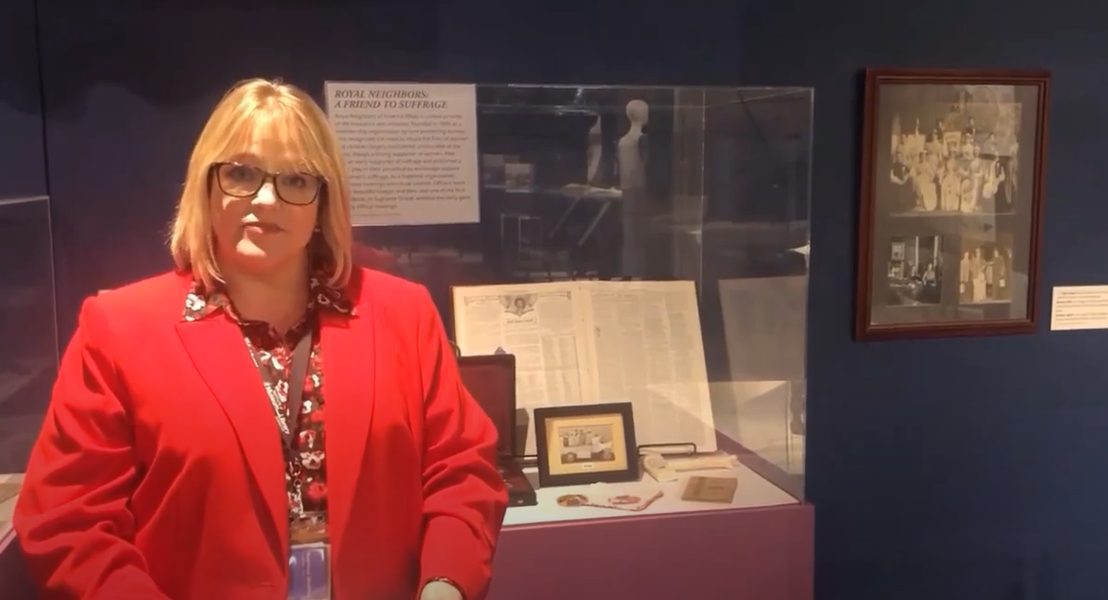
The Putnam’s women’s suffrage exhibit coincided with the 100th anniversary of the adoption of the 19th Amendment to the Constitution, giving most women the right to vote.
One, Myrtle Dade, was Supreme Recorder for Royal Neighbors, which was among the first women-led insurers that supported suffrage when it was founded in 1895. The company’s early members were active in supporting the suffrage movement from its initial days.
“They’re sort of our own local success story,” Mullins said of RNA. “Royal Neighbors was formed by nine women, and they really supported the suffrage movement across the nation.”
“These women were pioneers. They were heading urban households here in Rock Island and across the Midwest, away from the traditional family farms, while their husbands worked in industry,” Cynthia Tidwell, RNA’s president/CEO, said. “They banded together to provide emotional and social support to each other during those isolating and stressful times.”
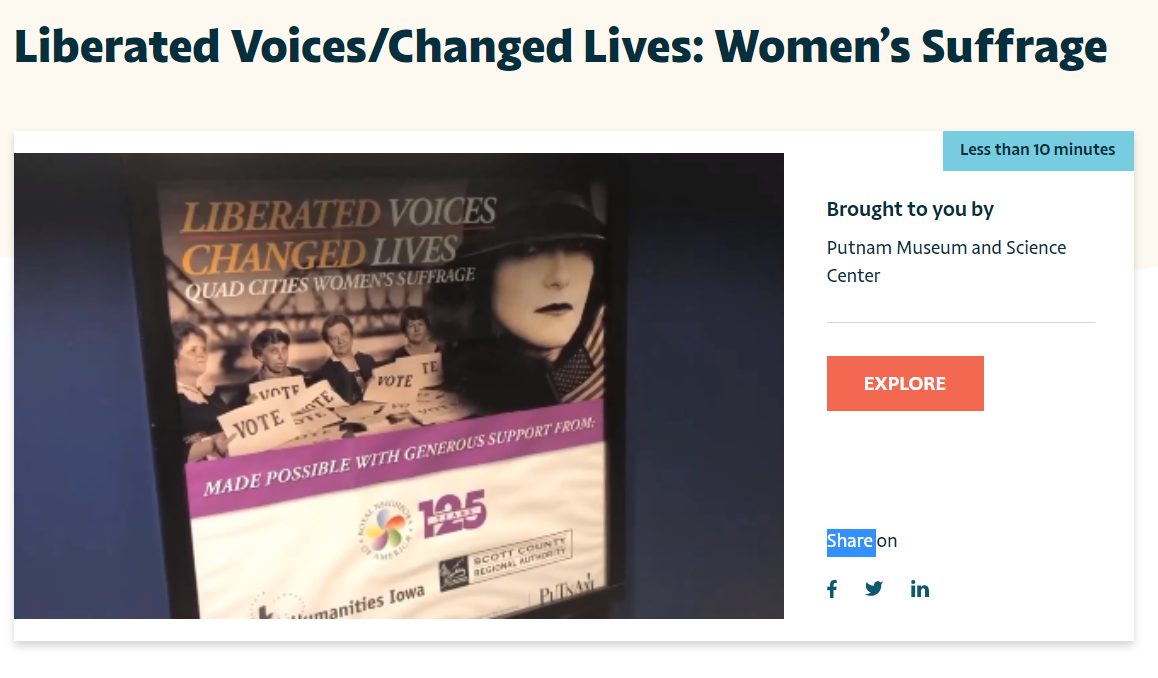
The page on the Civic Season website featuring the Putnam Museum video.
“As one of the first and largest women-led life insurers in the U.S., our pioneering heritage of standing shoulder-to-shoulder with women is as relevant today as the day we were founded in 1895,” she said. “We were not only one of the first to recognize that a woman’s life was worthy of life insurance protection, but we did so 25 years before women had won the right to vote.”
A royal treat for Royal Neighbors

Marie Young is communications manager for Royal Neighbors of America.
RNA recently posted on LinkedIn about the new Civic Season: “We’re thrilled to share this video, created by the Putnam for their suffrage exhibit last year, which features the women of Royal Neighbors. This work was selected by the Smithsonian to be part of The Civic Season virtual exhibit brought to you by Made By Us.
“During this time of reflection, we consider how our past has shaped our democracy and how our organization has and continues to work toward a more equitable future,” the post said.
“It’s really exciting for both the Putnam Museum, as well as Royal Neighbors, to be featured in a more public platform,” Marie Young, the new communications manager for Royal Neighbors, said recently. “And to just be part of this incredible movement, to try to remember our history in a more open and honest way. And give us a chance to really reflect on our past and think about how we got to where we are and really celebrate that. “It’s really neat that our history as an organization has been iconic in political advocacy for the women’s right to vote, as well as other efforts to be good neighbors within our communities,” Young said. “The Civic Season is really to help remember our history and then really focus on how we can continue to work towards a more equitable future for all.” “It’s really important to us and it means a lot to us to have the opportunity to remember the women that came before us,” she said. “They had a strong voice and then a strong part of forging our future.” “We can continue to work towards an equitable future not just for us, but for anyone who may still to this day be experiencing discriminatory acts or they don’t have as many freedoms or feel as safe as they should in our world,” Young said. “I think that when we can remember that, about 100 years ago, women couldn’t vote and we had to fight and use our voices to ensure that we were heard and had the rights that we have now, is all so important.”
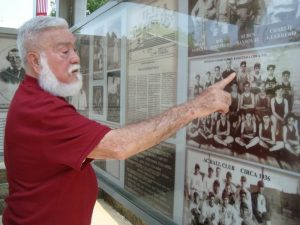
Tanilo Sandoval, a Mexican-American whose brothers Frank and Joe were killed in World War II, at Hero Street Memorial Park in Silvis.
A first for Fourth Wall
Chronicling American history and some of what makes this a complex, great, evolving country have been themes throughout the acclaimed career of Moline filmmakers Kelly and Tammy Rundle, who own Fourth Wall Films. The husband-and-wife team was thrilled to be featured in a June 23 Medium post online from Made by Us, “10 Ways to Bring Our Nation’s Promise to Life this Independence Day.” They were in number 3.
Understand our symbols and how they change.
A new exhibition at the Museum of the American Revolution in Philadelphia has dozens of rare American flags, the early state constitutions and the first printing of the proposed U.S. Constitution. Learn about the evolution of the American Flag, the triumphs and tensions that emerged as new states joined the Union, and consider your role in the ongoing effort to fulfill the promise of the American Revolution. Next, Fourth Wall Films has a mini-documentary on Flag Day and its origins. Finally, get up to speed on how the Confederate battle flag has become a persistent symbol in American life, with many different meanings. The American Civil War Museum is here to shed light on how this flag acquired its many meanings.
That “Flag Day” excerpt from Fourth Wall’s 2010 documentary, “Country School: One Room – One Nation,” was part of four submissions they sent into the Civic Season, which were all accepted and put on the site.
June 14th is Flag Day, a national observance of the U.S. flag, and this year’s unofficial kickoff for The Civic Season. The tradition began in Wisconsin in the 19th century after Bernard J. Cigrand observed the first Flag Day in his classroom at Stony Hill School in Fredonia on June 14th, 1885.
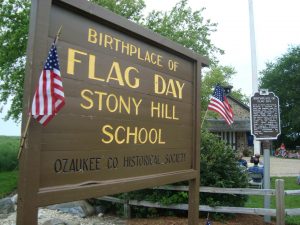
The Stony Hill School, Fredonia, Wis., the birthplace of Flag Day, June 14, 1885.
Cigrand’s students wrote essays on the meaning of the flag, and the following year, Cigrand made his first public proposal for the holiday in an article in the Chicago Argus. But Cigrand didn’t stick with teaching — he became a dentist in Illinois, but he did stick with the flag, advocating for a national observance of the flag for decades, according to a piece at Wisconsin Public Radio.
For “Country School,” the Rundles filmed at a 2009 Flag Day ceremony at his school north of Milwaukee, which talked about citizenship.
“There’s always sort of controversy around the notion of citizenship, concerning immigrants, but he went on to talk about how many immigrants had become new American citizens, and that happens every year,” Kelly Rundle said recently of the ’09 ceremony. “It was a nice piece about something – most people don’t know where Flag Day came from. It was this one little country school in Wisconsin.”
They were so happy to be chosen for the nationwide Civic Season program.
“We’re always looking for ways to put the work out in front of new people, new audiences,” Kelly said. “This not only does that, but it’s a really important project we can feel proud to be part of.”
The Putnam’s Mullins mentioned the Civic Season to them, and the Rundles submitted a form and their video excerpts directly to the program, separate from the Putnam.
Kelly submitted four entries – “Letters Home to Hero Street” (the full film co-produced with WQPT) and PBS Learning Media resources; “Tanilo’s Story” (short); “Country School: One Room – One Nation” (“Flag Day” excerpt) and “Lost Nation: The Ioway 2” (“Boarding School” excerpt), and they hoped they’d pick one.
“They had themes you were trying to match, and all of our stuff was thematically right on the money,” he said of Civic Season. “We had high hopes for at least one of them ending up on the site.”
The main overriding theme was American citizenship, Kelly said. The five-minute video, “Tanilo’s Story” was originally broadcast in 2013 through Hola America on WQPT, Quad Cities PBS, to raise money and awareness of the “Letters Home to Hero Street” documentary, which was co-produced with WQPT, premiering in 2015. The former included footage of Tanilo (a Mexican-American from Silvis) going on his 2012 Honor Flight to Washington, D.C., in honor of his brothers Frank and Joe – two of the Hero Street Eight, who lost their lives in World War II and the Korean War.
The purpose of the Civic Season was to “provide an opportunity for folks who aren’t highlighted normally, in regard to American citizenship,” Kelly said. “Stories other than mainstream stories.”
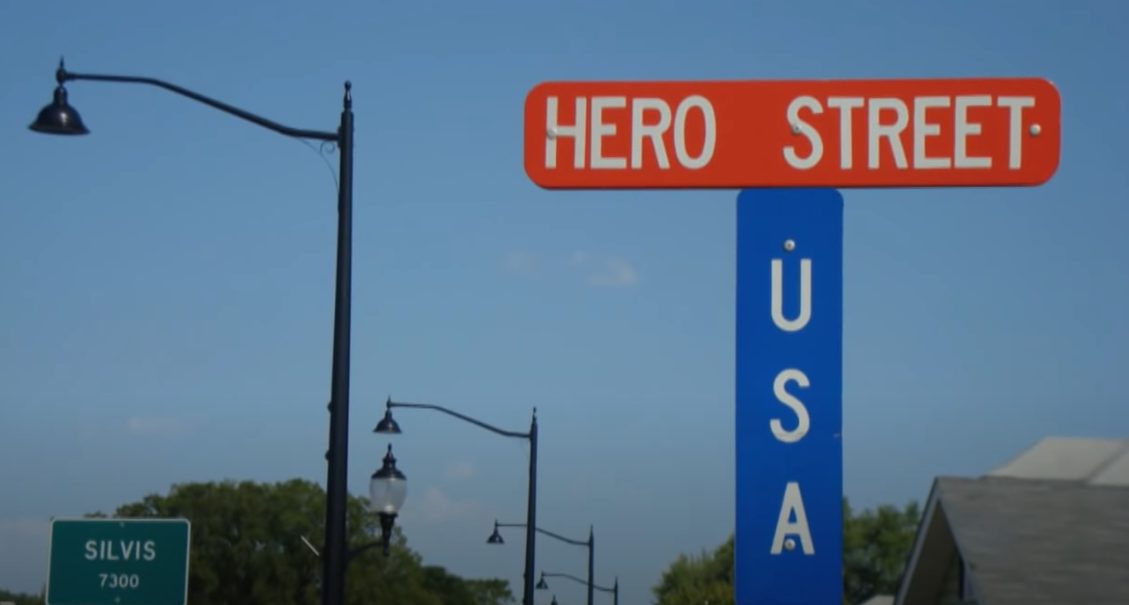
Second Street in Silvis lost six young men in World War II and two in the Korean War, more than any other street in America. Hero Street has provided over 100 service members since Mexican-American immigrants settled there in 1929
The Civic Season aimed to help tell stories of how various people became American citizens, he said. “One of the purposes is to help broaden the stories,” Kelly said. “They want to create room for everyone’s stories.”
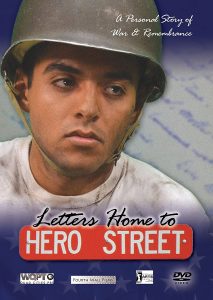
The 2015 Fourth Wall film “Letters Home to Hero Street” tells the story of Frank Sandoval, through letters he wrote to his family in Silvis.
In “Letters Home to Hero Street,” you can learn about the experience of Frank Sandoval, a Mexican-American soldier in World War II, through his letters home to his family. “Letters Home” is a film and teaching resource included on PBS LearningMedia. The resource is designed for grades 9-13+. Viewers can spend 25 minutes watching the documentary only, or up to 50 minutes exploring the additional resource for more information and activities.
Only a block and a half long, Second Street in Silvis lost six young men in World War II and two in the Korean War, more than any other street in America. Hero Street has provided over 100 service members since Mexican-American immigrants settled there in 1929.
In “Tanilo’s Story,” the World War II veteran reflects on his two brothers’ hard work, poverty, service as Mexican-Americans in the U.S. military, and love for their country.
Tammy Rundle has great memories of filming Tanilo Sandoval for his Honor Flight at Quad Cities International Airport.
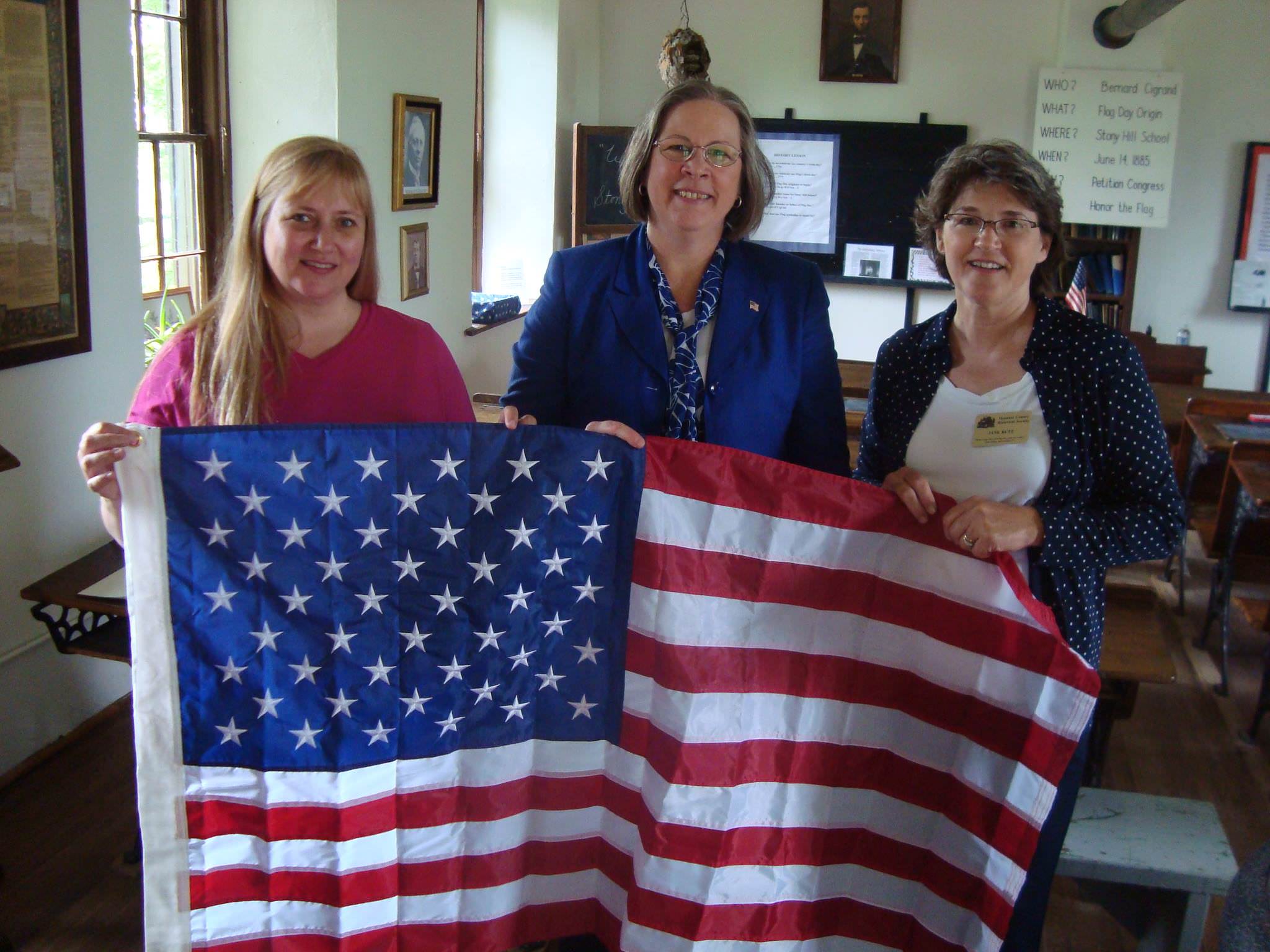
Moline filmmaker Tammy Rundle, left, with two organizers of a Flag Day ceremony in Wisconsin in 2009.
“That was amazing experience, being at the airport when he got on that plane,” she said recently. “We were there early in the morning, filming him and we were there when he came back. That was a remarkable experience, and he wasn’t even going to take that flight.”
Tanilo joined the military after World War II technically ended and didn’t see any combat, so he didn’t think he deserved to go on an Honor Flight, the Rundles said.
“He went for Joe and for Frank, his brothers, and that was an emotional experience for him,” Tammy said.
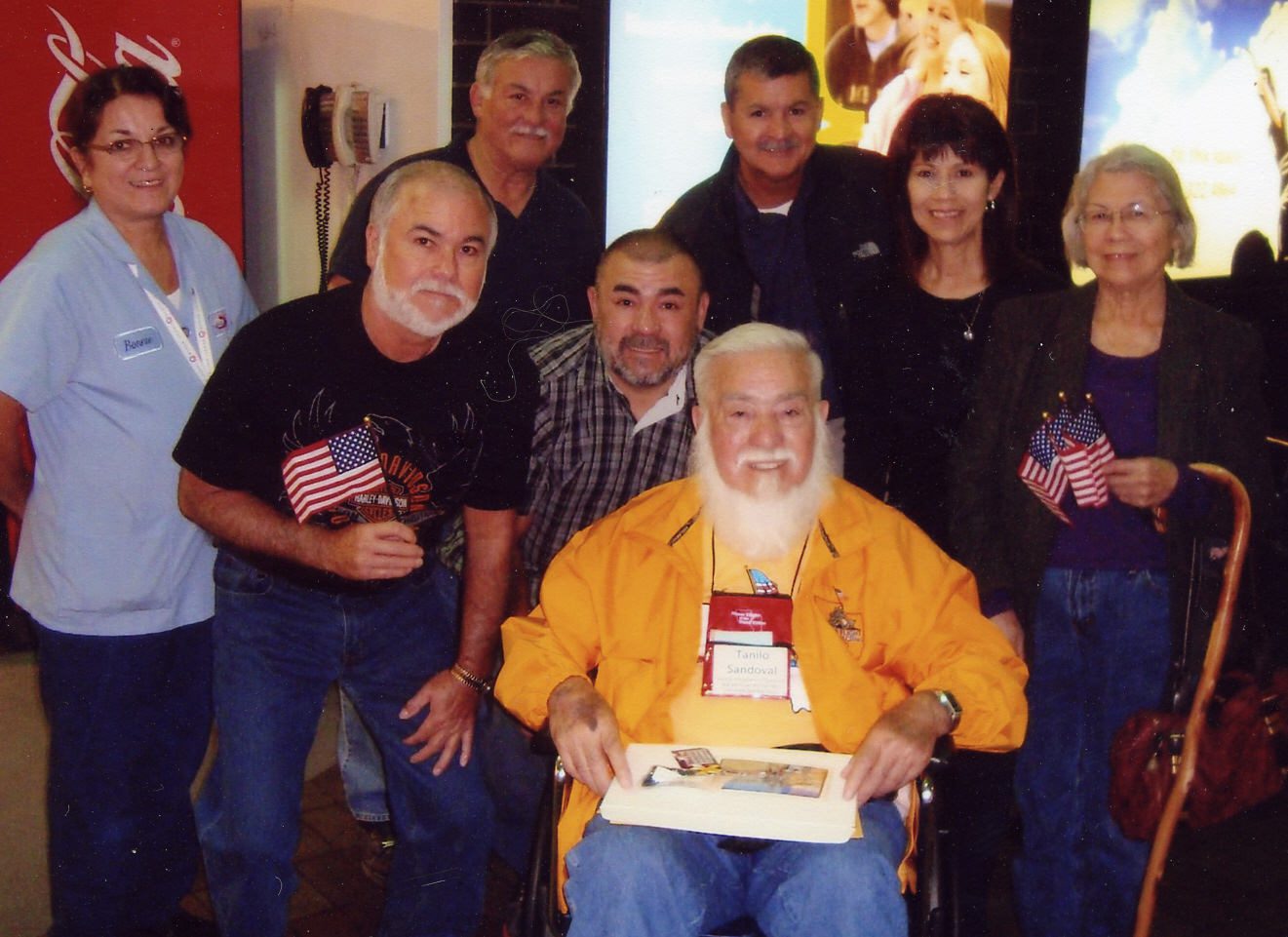
World War II veteran Tanilo Sandoval and his family upon the return of his Honor Flight on Sept. 20, 2012 at the airport in Moline.
“They do a nice job with those Honor Flights and it was beautifully done,” Kelly said.
“I’m just proud each of those films were accepted, because each of them means something to us,” Tammy said of Civic Season’s entries. “For them to be selected and included in this, it’s really exciting and it’s an honor for us.”
Coinciding with first Juneteenth federal holiday
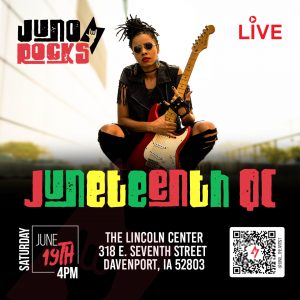
Rock Island High alum JUNO the Artist performed at the Juneteenth Festival at the Lincoln Center, Davenport, on June 19, 2021.
Mullins was impressed how much the new Civic Season plugged into the need to heal and improve from the roiling issues raised in the past couple years – global pandemic, racial injustice, police brutality, political polarization, economic inequality, anti-vaccine conspiracy, insurrection, hunger, climate change, election controversies and voter suppression efforts.
This Juneteenth, Made By Us and Civics Unplugged joined forces to host the inaugural Civic Season, the start of a new annual tradition. Beginning on Flag Day (June 14), and culminating after Independence Day (July 4), Civic Season is encouraging Americans to engage with our past, take action in the present and shape the future by taking part in events, exhibits and volunteer opportunities across the country.
Juneteenth (a combination of “June” and “19th”) is the oldest known celebration commemorating the ending of slavery in the United States.
On June 19, 1865, Union soldiers, led by Major General Gordon Granger, landed at Galveston, Texas with news that the Civil War had ended and that the enslaved were now free. This was two and a half years after President Lincoln’s Emancipation Proclamation, which had become official Jan. 1, 1863.
The U.S. Senate last month passed a bill to make June 19th a federal holiday; Illinois in May became the 47th state to make Juneteenth an official state holiday. Two days before the actual Juneteenth, President Biden signed legislation to make Juneteenth a federal holiday, enshrining June 19 as the national day to commemorate the end of slavery in the U.S.
“All Americans can feel the power of this day, and learn from our history,” Biden said at a ceremony at the White House, noting that it was the first national holiday established since Martin Luther King’s Birthday in 1983. He said signing the law was one of the greatest honors he will have as president.
Mullins of the Putnam was glad the Civic Season launched just as Juneteenth was celebrated as a new national holiday.
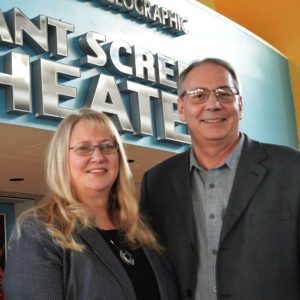
Tammy and Kelly Rundle at the Putnam Museum Giant Screen Theater, Davenport.
“It’s such an important moment in our nation’s history, that it really needed a stronger platform so that there’s an increase in a dialogue around Juneteenth,” she said, also happy that Civic Season also provides so many new resources for teachers to expand civics education. “There are resources there for teachers to be expanding dialogues, specifically, within civics education, kind of expanding the lens,” Mullins said. “It’s making space for more stories as part of our history, right? I think there’s a debate nationwide on to fix education and content that this provides another resource for teachers.”
“Partners across the nation are each doing different activities and submitting stories and really trying to broaden the lens,” she said. “I think of storytelling as part of history, which is in wonderful alignment with the work underway at the Putnam around our region’s history, and broadening storytelling across the community.”
“I think it creates kind of a shared platform, and as well as a rallying cry for others to join the movement,” Mullins added of Civic Season. “You know, the time period of really aligning this work around in a specific season of the year, brings new attention to the purpose and the values behind our country.” “I think it just kind of brings us all back to the spirit of kind of the founding values of the country for a little more intentional conversation with these holidays — in particular, July 4th that has become so much about the barbecue and the fireworks and we need to reassert tradition around those anniversaries. And some of the values that they were founded on.” The solid, huge foundation of Civic Season can only be built upon, bigger and better, Mullins said. “I think we will grow into this as we see how other partners are responding,” she said. “We’re starting that conversation with partners on how we can be offering more of a collaborative effort across the Quad-Cities Civic Season in 2022.”











